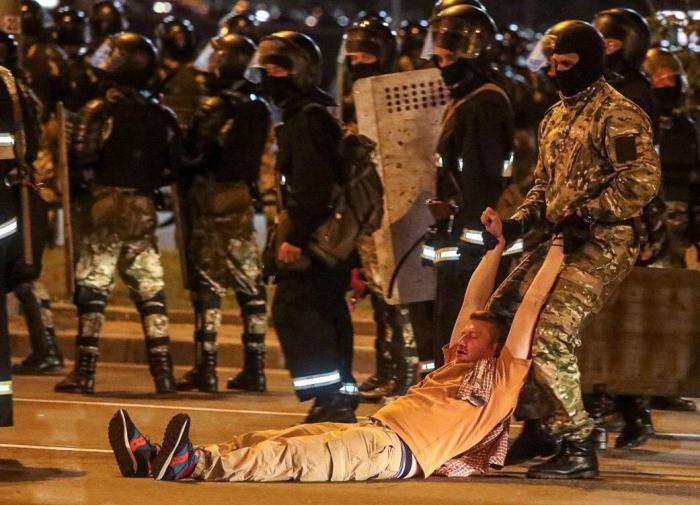Riots in Belarus continue as people demand the authorities should recount the votes cast during the presidential election in the country. The police cordoned off the center of Minsk, where clashes took place the day before. To disperse the protesters, military special forces were involved.

People started gathering in groups near metro stations in different parts of the city. One of the first serious clashes took place on Kalvariyskaya Street, where the protesters blocked traffic. Riot police used noise grenades and rubber bullets against them. One of the bullets wounded a journalist of Nasha Niva publication, Natalya Lubnevskaya, in the leg.
The editor-in-chief of the publication, Yegor Martinovich, disappeared in Minsk that night. He was returning home in his car after covering the protests and managed to send an SOS signal to the editorial office. Tatiana Kapitonova, a photojournalist of Belsat TV channel, was concussed during the dispersal in Minsk. The whereabouts of Rossiya Segodnya photojournalist Ilya Pitalev remain unknown too.
Clashes with the police took place near Yubileinaya Hotel, where up to 15 people were detained. Flash-noise grenades were used against protesters on Pobediteley Avenue, near the Pushkinskaya metro station, and in the area of the Riga shopping center, where people set up barricades.
Towards nightfall, a significant part of the protesters - about 3,000 people - found themselves near the Pushkinskaya metro station, which became a major centre of the public protest. People started building barricades, shooting began, snipers were spotted. A bus driver was seriously wounded and a man was killed in the area in the course of the riots. Representatives of the Ministry of Internal Affairs of Belarus explained that an unknown device exploded in his hands.
According to local media reports, special forces of the internal troops used unreasonably brutal force when detaining the protesters, who at first were behaving peacefully without showing any resistance. However, they later started erecting barricades and burning car tires. In the area of Pushkinskaya metro station, they started throwing Molotov cocktails and firecrackers at special forces. Motorists started joining the protests, deliberately blocking traffic on the streets leading to the center, not to let military hardware there. However, the riot police started using ER vehicles to reach the protesters disguised as doctors.
Protests took place in many other Belarusian cities and were dispersed by riot police. Protesters were detained in cities of Mogilev, Vitebsk, Grodno, Bobruisk, Lida, Gorki, Molodechno, Baranovichi. The actions of the special forces were especially brutal in the city of Brest, where the police opened fire shooting rubber bullets at the crowd.
It was reported that many of the protesters were taken away from the scene in police vans and then released in other part of the city. Nevertheless, there are many detainees, and there is no official information on this matter.
The Internet in Belarus remains paralyzed.
Prior to the start of new protests, the Investigative Committee of Belarus announced the initiation of 21 criminal cases following post-election demonstrations in 12 cities. Investigations are conducted into riots, hooliganism, resistance and violence against police officers. More than 80 people were detained as part of the investigation. Most of the detainees are mainly young men aged 20-25; some of them were allegedly drunk or under the influence of drugs at the time of their arrest. Alexander Lukashenko, the President of Belarus, said in a news report that most of the detainees were "stoned."
Videos that appeared on the Internet showed the footage of protesters ramming their cars into the riot police, running the officers over and driving away.
Citizens of Belarus took to the streets and arranged massive unauthorized actions of protest on Sunday and Monday. The protesters are furious about the outcome of the presidential election in the country, which incumbent head of state Alexander Lukashenko won in a landslide victory, as the Central Electoral Committee of Belarus says. According to official data, the incumbent head of state received 80.08 percent of the vote followed by Svetlana Tikhanovskaya with 10.09 percent.
Tikhanovskaya's headquarters said that they do not recognize the results of the CEC: according to her representatives, data from polling stations in all regions of the republic show that Svetlana Tikhanovskaya gained 70-80%. On Tuesday morning, it became known that Tikhanovskaya was forced to leave Belarus for Lithuania.
No comments :
Post a Comment